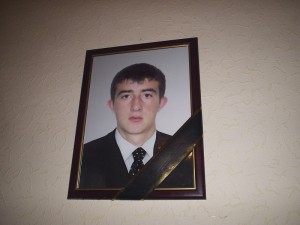Experts questioned on the case of serviceman Hayk Khachatryan deceased of chickenpox
17:44, October 21, 2014 | News, Own news | Right to Fair Trial, Right to Life, Rights of Soldiers/Recruits | Armed Forces, Hayk Khachatryan On October 21, 2014, the trial on the case of serviceman Hayk Khachatryan deceased of chickenpox proceeded at the General Jurisdiction Court of Erebuni and Nubarashen administrative districts of Yerevan, presided by judge V. Grigoryan. Note that charges were brought against Mikayel Mikayelyan, Head of the RA Central Clinical Military Hospital and Minas Mkrtchyan, Head of the Neurological Department of the Hospital, for their negligence in their professional services, resulting in severe damage, namely the death of Hayk Khachatryan.
On October 21, 2014, the trial on the case of serviceman Hayk Khachatryan deceased of chickenpox proceeded at the General Jurisdiction Court of Erebuni and Nubarashen administrative districts of Yerevan, presided by judge V. Grigoryan. Note that charges were brought against Mikayel Mikayelyan, Head of the RA Central Clinical Military Hospital and Minas Mkrtchyan, Head of the Neurological Department of the Hospital, for their negligence in their professional services, resulting in severe damage, namely the death of Hayk Khachatryan.
The aggrieved party was again absent from the court hearing and stated their position on the expert examination opinion in a letter submitted. According to the letter, the legal successor to the victim and his representative considered it pointless to attend the hearing and had no doubts that the experts issued the opinion lacking any scientific reasoning in defense of the accused doctors. The letter also stated that the aggrieved party would present its position both on the results of the trial and the expert examination opinion in writing in course of the debates.
At the hearing of October 21, 2014, the Court questioned Zaven Ter-Avetikyan, Melanya Shaboyan and Gayane Melik-Andreasyan, 3 expert members of the Forensic Re-Examination Commission.
At the beginning of the questioning, the Chair of the Forensic Re-Examination Examination, Head of the Thoracic Surgery Chair at the Yerevan State Medical University, surgeon Zaven Ter-Avetikyan expressed his condolences regarding the tragedy and at the same time stated that the “medicine has no universal tools to cure all the diseases; some of them are nonresponsive to the treatment standards.” The expert also noted that upon looking through the case records, he did not find any medical error that could result in the tragedy.Z. Ter-Avetikyan added that even if the diagnosis were correct, there was no speedy special treatment for chickenpox, and the standard treatment had a high probability of fatal outcome. In answer to the questions of the prosecutor, the expert said that in case of abdominal pains, the doctor first of all had to check for any acute abdominal pathologies and prescribe dynamic surveillance to this end. He also said that the instrumental equipment had but supplementary role for diagnosing the disease, and the final opinion was shaped through palpation by the doctor. The expert noted that not transferring the patient to an infectious diseases hospital was not wrong since such hospitals were one-dimensional and were unable to provide treatment for acute abdominal pathologies. The Prosecutor stated that according to the expert examination opinion, the surgeon collaborated with the infectiologist, while the criminal records had no such information, and asked for clarifications. Z. Ter-Avetisyan noted that the data on collaboration were not recorded anywhere and added that the doctors above examined the patient in their own turn, and if any of them had anything to add to the treatment prescribed by the other, they could do so. In answer to another question, the expert stated that infectiologist was not obliged to further the issue of transferring Hayk Khachatryan to infectious diseases hospital since he/she “had already fulfilled his/her duty.”
The defense asked no questions, and in response to another question of the judge, the expert said that no one had approached Hayk Khachatryan at night since there was no need for it. In response to the judge’s question concerning the reasons why Hayk Khachatryan developed visceral, generalized chickenpox, the expert said that adults, especially those with weak bodies, developed more complicated forms of the disease.
Melanya Shaboyan, Candidate of medical sciences, associate professor, and assistant professor at the Chair of Infectious Diseases at the State Medical University, stated that no literature has described so far any improvement of the patient’s state in case of rapid forms of diseases. Expert M. Shaboyan also insisted that patients with acute abdominal pains had to be placed at surgical unit and could not be transferred to any other unit or hospital unless the abdominal pathology was excluded. According to the expert, the visceral, generalized forms of the disease usually ended in death, and the abdominal pains were not symptomatic of the visceral chickenpox; the visceral form was diagnosed in case of a drastic deterioration of the patient’s state, accompanied by headaches, nausea and bleeding.
At the court hearing, the judge also questioned another Examination Commission member, epidemiologist, virologist, Candidate of Medical Sciences, Professor, expert Gayane Melik-Andreasyan. She mentioned that it was impossible to definitely determine whether Hayk Khachatryan was infected with chickenpox at the military unit or at hospital. In course of the questioning, the expert noted that proper anti-epidemic measures had been taken. While the case records lacked any data on observation measures, the expert insisted that such measures for acute respiratory diseases should have already been taken by that time, in compliance with the relevant decree of the RA Minister of Health.
Another expert summoned to the court to testify on the examination opinion, Mushegh Mirijanyan did not attend the hearing due to a surgery, and the hearing was therefore postponed. The next meeting fixed at 10:00 a.m., November 6, 2014 will cover the questioning of expert M. Marijanyan.
